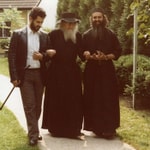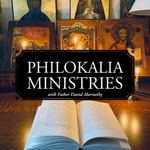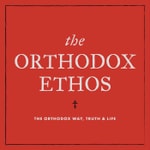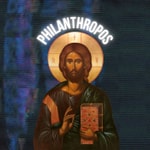Orthodox Wisdom – Details, episodes & analysis
Podcast details
Technical and general information from the podcast's RSS feed.

Orthodox Wisdom
Readings from Saints of Holy Orthodoxy
Frequency: 1 episode/5d. Total Eps: 267

Recent rankings
Latest chart positions across Apple Podcasts and Spotify rankings.
Apple Podcasts
🇨🇦 Canada - religion
29/07/2025#71🇬🇧 Great Britain - religion
29/07/2025#65🇩🇪 Germany - religion
29/07/2025#32🇺🇸 USA - religion
29/07/2025#31🇫🇷 France - religion
29/07/2025#94🇨🇦 Canada - religion
28/07/2025#71🇬🇧 Great Britain - religion
28/07/2025#63🇩🇪 Germany - religion
28/07/2025#60🇺🇸 USA - religion
28/07/2025#29🇫🇷 France - religion
28/07/2025#94
Spotify
No recent rankings available
Shared links between episodes and podcasts
Links found in episode descriptions and other podcasts that share them.
See allRSS feed quality and score
Technical evaluation of the podcast's RSS feed quality and structure.
See allScore global : 43%
Publication history
Monthly episode publishing history over the past years.
The Firmament and the Waters Above - St. John Chrysostom
mercredi 28 août 2024 • Duration 31:58
What is the firmament? What does scripture mean by “waters above the heavens”? St. John expounds upon the Scriptural testimony and raises our minds and hearts both to God’s creation and God Himself. 0:00 Introduction 1:26 Scripture: Genesis 1:6-8 and Psalm 148:4-6 2:33 Commentary on Psalm 148:4 3:00 Commentary on Genesis 1 (Homily 4) 18:16 Commentary on Genesis 1 (Homily 6) 22:00 On the Statues to the People of Antioch (Homily 9) 22:59 On the Statues to the People of Antioch (Homily 12) 25:04 Commentary on Matthew 26:6-7 (Homily 80) 25:22 Commentary on Hebrews 8:1-2 (Homily 14) 26:52 Commentary on Hebrews 9:2 (Homily 15) 27:14 Commentary on Ephesians 5:15-17 (Homily 19) 31:36 Scripture: Psalm 148:4-6 To my knowledge, what follows are all of St. John Chrysostom’s teachings on day two of creation, the firmament and the waters above that are available in English. I did not focus on his commentary on the sun, moon, and stars when placed into the firmament on day four. The golden-mouthed Archbishop poured over the scriptures and his homilies on Scripture continues to stand out as exceedingly faithful to the truth and inspired by the Holy Spirit. Regardless of what modern scientists and astronomers tell us, the Patristic axiom remains immovable: we must follow the Holy Fathers. So much of modern science is saturated with philosophy and pseudo-science. The modern heliocentric model has turned the plain reading of many scriptures on their head. In addition to the many scientific and observational reasons to question the heliocentric dogma so often assumed today, the Holy Scriptures and the Holy Fathers, especially St. John Chrysostom, beckon us to revisit modern assumptions and reconsider the truth about the realm in which we God has placed us to work out our salvation. -READ St. John’s commentary on Genesis 1-17: https://archive.org/details/saint-john-chrysostom-homilies-on-genesis-1-17/page/59/mode/1up -READ St. John’s homilies on Matthew, Ephesians, Hebrews, and more: https://www.newadvent.org/fathers/ -READ St. John’s commentary on Psalm 148: https://www.amazon.com/St-John-Chrysostom-Commentary-Paperback/dp/B010TSV5E2 -READ St. John’s homilies On the Statues to the People of Antioch: https://www.ccel.org/ccel/schaff/npnf109.xix.xi.html#fna_xix.xi-p40.1 -FIND an Orthodox parish and monastery near you: https://orthodoxyinamerica.org/ _______ St. John teaches: ‘The water above the heavens.’ You hear Moses also saying that he left some of the waters below, and caused some to float on the surfaces of the heavens, fixing the firmament in the middle of the abyss, and let the waters remain on the surfaces. -Commentary on Psalm 148:4 And what is more pleasing or more beautiful than the firmament of Heaven. -Homily 80 on the Gospel of Matthew The text goes on: "God made the firmament, and God divided the water which was below the firmament from the water which was above the firmament." That is to say, once the firmament existed, he ordered some of the water to go below the firmament, and some to be on top of the firmament. Now, what would you say this means, the firmament? Water that has congealed, or some air that has been compressed, or some other substance? No sensible person would be rash enough to make a decision on it. Instead, it is better to be quite grateful and ready to accept what is told us and not reach beyond the limits of our own nature by meddling in matters beyond us, but rather to know only the simple fact and keep it within us—namely, that by the Lord's command the firmament was produced, causing division of the waters, keeping some below and being able to carry the rest elevated on top of it. -Homily 4 on Genesis _______ Orthodox Wisdom is dedicated to sharing the writings and lives of the Saints of the Orthodox Church. Glory to Jesus Christ!
Heresy and the Worldly Spirit is Contrary to Noetic Prayer - Fr. Ephraim Triandaphillopoulos
mercredi 21 août 2024 • Duration 11:51
A reading of Chapter Four from "Noetic Prayer as the Basis of Mission and the Struggle Against Heresy" by Archimandrite Ephraim Triandaphillopoulos In six short chapters Fr. Ephraim, like a spiritual doctor and specialist in spiritual diseases, dissects the disease of heresy and its cause, offering both as method of cure and cure itself the medicine of noetic prayer. This book is required reading for every Orthodox missionary, or, rather, every Orthodox Christian, for there is no Christian who does not seek to be made whole and bring wholeness and spiritual health to his neighbor. -BUY the book here: https://uncutmountainpress.com/shop/product/noetic-prayer-as-the-basis-of-mission-and-the-struggle-against-heresy/ Archimandrite Ephraim Triandaphillopoulos, an inspirational and influential preacher, is the Protosyngellos (Chancellor) of the Diocese of Siatista in north western Greece. He is the author of many books, including: The New Age: Challenge or Invitation?, Magic and Its Various Manifestations, The Old Testament and the New Idol Worshipers.” You can read more about Fr. Ephraim and his work at: http://www.patirefraim.com/ -FIND an Orthodox parish and monastery near you: https://orthodoxyinamerica.org/ This recording was originally posted on the @OrthodoxEthos channel in December 2022: https://youtu.be/gqBfkiQbyKA?si=3nOrC-XDg3ar_RL8 _______ Orthodox Wisdom is dedicated to sharing the writings and lives of the Saints of the Orthodox Church. Glory to Jesus Christ!
On Attention and Distraction - St. Ignatius Brianchaninov
lundi 8 juillet 2024 • Duration 07:49
A word for us all from one the greatest Russian saints of recent times. "The sons of the world consider distraction to be something innocent, but the holy fathers recognize it to be the origin of all evils." -LISTEN to other recordings of St. Ignatius Brianchaninov ---My Cross and the Cross of Christ https://youtu.be/RDmmWFqGGYA ---Exhortation on the Prayer Rule https://youtu.be/YvCo0NiHMjU ---The Antichrist Will Be the Natural Result of the Spiritual Direction of Man https://youtu.be/Y97eoXfZJ_k ---On Prayer https://youtu.be/ElPypoFJM3A -BUY a number of books by St. Ignatius here: https://www.holytrinitypublications.com -FIND an Orthodox parish and monastery near you: https://orthodoxyinamerica.org/ Text is from "Divine Ascent: A Journal of Orthodox Faith", Autumn 2001, No. 7 _______ St. Ignatius writes: The sons of the world consider distraction to be something innocent, but the holy fathers recognize it to be the origin of all evils. The person who is given up to distraction has, concerning all subjects and even the most important ones, a very light and most superficial understanding. One who is distracted is usually inconstant. The feelings of his heart usually lack depth and strength; they are not solid but transitory. As a butterfly flits from flower to flower so also a distracted person passes from one earthly satisfaction to another, from one vain care to another. Distraction itself punishes the one who is devoted to it. With time everything bores him, and as one who has not acquired any sound understandings and fundamental impressions whatsoever, he is given up to a tormenting endless despondency. As much as distraction is harmful in general, it is especially harmful in the work of God and the work of salvation, which requires constant and intense vigilance and attention. "Watch and pray lest you enter into misfortune," says the Savior to his disciples (Matthew 26: 41). "I say to all: watch," (Mark 13:37), the Savior said to all Christianity, and therefore, he said it to us in this time. He who is leading a distracted life is directly contradicting the commandments of the Lord Jesus Christ with his life. All of the saints diligently fled from distraction. They were concentrated in themselves constantly or at least as often as possible They paid attention to the movements of their mind and heart and they directed them according to the testament of the gospel. The habit of attending to oneself keeps one from distraction, even amongst distractions which are noisy and surrounding one on all sides. The attentive person abides in solitude, even amidst a multitude of people. A certain great father who had learned by experience the benefit of attention and the harm of distraction said that without intense watchfulness over oneself it is impossible to succeed in even one virtue. The attentive life weakens the effect of a person's bodily feelings. It sharpens, strengthens and warms the feelings of the soul. While on the contrary, distraction dulls the feelings of the soul. _______ Orthodox Wisdom is dedicated to sharing the writings and lives of the Saints of the Orthodox Church. Glory to Jesus Christ!
My Cross and the Cross of Christ - St. Ignatius Brianchaninov
samedi 26 novembre 2022 • Duration 08:31
St. Ignatius Brianchaninov writes in his book “The Field: Cultivating Salvation”:
“Filled with worry and futility is my cross, no matter how heavy it may be. if it does not become the Cross of Christ through our following in His footsteps. My cross becomes the Cross of Christ if I am a disciple of Christ, because a disciple of Christ is firmly convinced that Christ watches over him at all times; that Christ allows his sorrows as the inescapable and inevitable condition of Christianity; and that no sorrow would ever approach him if it were not allowed by Christ; and that through sorrows, the Christian becomes one with Christ, becomes a partaker of His lot on earth, and later in heaven.”
“Patient bearing of "my cross" is true recognition of one's sins. In this knowledge, there is no self-deception. However, he who admits himself to be a sinner but at the same time complains and groans from his cross, only proves that he is lying to himself with his superficial admission of sinfulness.”
“Thank God from the cross, thank Him for the priceless treasure of your own cross, for the precious gift to be able to emulate Christ's sufferings.”
“The Cross of Christ raises the crucified disciple of Christ from the earth. The disciple of Christ who is crucified on his cross thinks only of the heights, with his mind and heart he lives only in heaven, already seeing the mysteries of the Spirit in Christ Jesus, our Lord.”
This is a recording of chapter 32 from “The Field: Cultivating Salvation”. Buy the book here: https://www.holytrinitypublications.com/the-field
Orthodox Wisdom is dedicated to sharing the writings and lives of the Saints of the Orthodox Church. Glory to Jesus Christ!
You Can Become A Saint! - Missionary Tract by Fr. Daniel Sysoev
dimanche 20 novembre 2022 • Duration 12:36
A newly translated Missionary Tract written by Hieromartyr Daniel Sysoev. We commemorate this great missionary's martyrdom on Nov 7/20.
-Find Fr. Daniel's book for sale here: https://mission-shop.com
-Support the Rev. Daniel Sysoev Benevolent Fund that supports the widows and children of priests who die and leave their family in great need: https://mission-shop.com/pozhertvovanie-na-fond/
-Watch an interview with Fr. Daniel's Matushka, daughter, and two spiritual children at the Orthodoxy Christian Theology channel here: https://youtu.be/cXFNiKcoi9I
-Read a brief Life of the Hieromartyr here: https://orthochristian.com/117356.html
-Watch myself and Patrick (Craig) Truglia discuss Fr. Daniel's street mission tips followed by a Q&A: https://youtu.be/YOE9D2n6Xt0
"Sometimes people say: “How can I possibly become a saint? Just avoiding hell is plenty! And anyway, it would be prideful of me to want to become like the holy apostles, martyrs, or monastic saints. This was meant for them, but probably not for me.” But Christ says: "Be ye therefore perfect, even as your Father Which is in Heaven is perfect" (Matthew 5:48). From the lives of the saints it is clear that each of them, by his own choice, wanted to attain a great reward in Heaven and to rid himself of the burden of sin as quickly as possible, since sin was preventing him from ascending from strength to strength on the path to holiness."
“Let us not deceive ourselves: any pause in the spiritual life is a step backwards! If we try to grasp the secret of success in any earthly undertaking – be it sport, science, or art – we will see that the successful are those that continue to work until they have attained their goal, regardless of hardships or setbacks. The successful person never says: “I cannot” or “that is beyond me,” but firmly believes that he will attain his desired result, anticipating the thrill of victory.”
“How can we live calmly when we know our neighbor is headed for perdition? For if we do not try to preach to him, this means we do not love him: for he that loveth not his brother whom he hath seen, how can he love God Whom he hath not seen? (1 John 4:20).”
“The Lord arranges for the missionary to learn through converts. The Lord elevates the missionary higher and higher. But there is a necessary condition: the missionary must pray. Of course, mission itself teaches this: if someone does not pray, he will begin to grow discouraged due to his lack of success. If someone tries to be the mouth of God the Father, but does not turn to God the Father, nothing will come of it. One does not play around with missionary work. That is why missionary work forces people to pray, especially when they find themselves in extraordinary circumstances (and the missionary always lives in such extraordinary circumstances, for he is living between three worlds). His life is utterly intense, utterly rich, and the missionary grows accustomed to relying constantly upon the Lord God.”
Orthodox Wisdom is dedicated to sharing the writings and lives of the Saints of the Orthodox Church. Glory to Jesus Christ!
The Life of St. John the Almsgiver, Patriarch of Alexandria
samedi 12 novembre 2022 • Duration 15:20
We commemorate St. John the Almsgiver on Nov 12 / Nov 25.
From the Life of St. John, written by St. Sophronius of Jerusalem: "And indeed he was always on all occasions amiable to all, advising, encouraging, assisting, acting as peacemaker, doing a kindness, reconciling, and ever anxiously striving to display his love for the highest virtue in all its forms."
"He absolutely refused to receive presents or money or any kind of gift whatsoever, not only as a fee for ordination, but also on any other pretext or excuse, whether the matter were great or small, for he ever kept in mind the words of the writer of Proverbs, who says ‘He that is greedy of gain destroys himself but he that hateth taking gifts shall live’. [Prov 15:27 LXX] Moreover from all those who were seeking ordination at his hands, whether as bishops or priests, he demanded a written declaration in order to safeguard the orthodox faith and to secure the observance of all the ordinances set forth in the Canons."
Read the Life here: https://www.omhksea.org/archives/3364
Orthodox Wisdom is dedicated to sharing the writings and lives of the Saints of the Orthodox Church. Glory to Jesus Christ!
Ecumenism Has A Spirit of Wickedness and is Dominated by Unclean Spirits - St. Ephraim of Katounakia
lundi 7 novembre 2022 • Duration 05:09
The word of the Lord to St. Ephraim: "Ecumenism has a spirit of wickedness and is dominated by unclean spirits."
Demetrios Tselengidis, professor of dogmatic theology at the University of Thessaloniki, writes of his experiences with St. Ephraim of Katounakia:
So I asked him on the matter in hand - if he could tell me what kind of thing Ecumenism is. He replied outright and without any difficulty:
"This question, my child, had also been posed by someone else, some time before you. I myself have been up here on these rocks for forty years... I have even forgotten my Greek (note that he had completed Middle School) and as such, I haven’t preoccupied myself with that issue. But, because I had to reply – seeing that I had been asked about it, and since I had no knowledge of the matter - I went to my cell and prayed, asking Christ to inform me what Ecumenism is. I received His reply, which was that Ecumenism has a spirit of wickedness and is dominated by unclean spirits."
So I asked him exactly how that was verified. He replied that "after praying, my cell became filled with an unbearable stench, which caused my soul to feel asphyxiated; I couldn’t breathe spiritually."
I asked him if that had been an extraordinary event for him, or if that was the way that Christ responds in analogous cases, and he assured me that "in all the cases that are involved with sorcery, with unclean spirits, that is the state in which He enlightens me. Sometimes there is a spoken response, but in the present case, that was His answer and I have the absolute certainty that Ecumenism does not have the Holy Spirit, but the unclean spirit."
Read the full account from Professor Tselengidis here: https://orthochristian.com/93492.html
Photo in the thumbnail is of an Ecumenical Prayer gathering at Sts. Peter and Paul’s Coptic Church in Cairo, Egypt in 2017. Featured at this gathering was Patriarch Theodoros II of Alexandria, Pope Francis of Rome, Coptic Pope Tawadros II, Ecumenical Patriarch Bartholomew and more: https://www.ecupatria.org/2017/05/01/ecumenical-prayer-in-egypt-for-peace-and-unity/
Many canons condemn prayer with the heterodox, among other expressions of the heresy of ecumenism. Apostolic Canon 45: “Let a bishop, presbyter, or deacon, who has only prayed with heretics, be excommunicated: but if he has permitted them to perform any clerical office, let him be deposed.”
A useful starting point to understand the heresy of ecumenism is the 1983 ROCOR condemnation of ecumenism, added to the Synodikon read on the Sunday of Orthodox in Great Lent: "Those who attack the Church of Christ by teaching that Christ’s Church is divided into so-called “branches” which differ in doctrine and way of life, or that the Church does not exist visibly, but will be formed in the future when all “branches” or sects or denominations, and even religions will be united into one body; and who do not distinguish the priesthood and mysteries of the Church from those of the heretics, but say that the baptism and eucharist of heretics is effectual for salvation; therefore, to those who knowingly have communion with these aforementioned heretics or who advocate, disseminate, or defend their new heresy of Ecumenism under the pretext of brotherly love or the supposed unification of separated Christians, Anathema!"
Orthodox Wisdom is dedicated to sharing the writings and lives of the Saints of the Orthodox Church. Glory to Jesus Christ!
Who Should I Marry? - Advice from Elder Aimilianos
vendredi 4 novembre 2022 • Duration 10:00
Elder Aimilianos says, “Once we reach a certain age, moreover, the choice of one's life partner is a matter which should not be put off. Neither should one be in a hurry, because, as the saying goes, "quick to marry, quick to despair". But one should not delay, because delay is a mortal danger to the soul. As a rule, the normal rhythm of the spiritual life begins with marriage. An unmarried person is like someone trying to live permanently in a hallway: he doesn't seem to know what the rooms are for. Parents should take an interest in the child's social life, but also in his prayer life, so that the blessed hour will come as a gift sent by God. Don't choose a person who wastes his time at clubs, having good time, and throwing away his money on traveling and luxuries. Neither should you choose someone who, as you'll find out, conceals his self-centeredness beneath words of love. Don't choose a woman as your wife who is like gun powder, so that as soon as you say something to her, she bursts to flames. She's no good as a wife. Discuss things in advance with your spiritual father. Examine every detail with him, and he will stand by your side as a true friend, and, when you reach the desired goal, then your marriage will be a gift from God (cf. 1 Cor 7.7). God gives his own gift to each one of us. He leads one person to marriage and another to virginity. Not that God makes the choice by saying "you go here", and "you go there", but he gives us the nerve to choose what our heart desires, and the courage and the strength to carry it out. If you choose your spouse in this way, then thank God. Bring him into touch with your spiritual father. If you don't have one, the two of you should choose a spiritual father together, who will be your Elder, your father, the one who will remind you of, and show you God.”
Read the full sermon: http://orthodoxinfo.com/praxis/marriage.aspx
Listen to the full sermon "Marriage: The Great Sacrament" from Orthodox Wisdom on this platform.
Orthodox Wisdom is dedicated to sharing the writings and lives of the Saints of the Orthodox Church. Glory to Jesus Christ!
On Prelest (Spiritual Deception) - Fr. Seraphim Rose
lundi 24 octobre 2022 • Duration 06:50
Fr. Seraphim Rose writes:
The concept of prelest, a key one in Orthodox ascetical teaching, is completely absent in the Protestant-Catholic world which produced the "charismatic" movement; and this fact explains why such an obvious deception can gain such a hold over nominally "Christian" circles, and also why a "prophet" like Nicholas Berdyaev who comes from an Orthodox background should regard it as absolutely essential that in the "new age of the Holy Spirit" "There will be no more of the ascetic world-view." The reason is obvious: the Orthodox ascetic world-view gives the only means by which men, having received the Holy Spirit at their Baptism and Chrismation, may truly continue to acquire the Holy Spirit in their lives; and it teaches how to distinguish and guard oneself against spiritual deception. The "new spirituality" of which Berdyaev dreamed and which the "charismatic revival" actually practices, has an entirely different foundation and is seen to be a fraud in the light of the Orthodox ascetical teaching. Therefore, there is not room for both conceptions in the same spiritual universe: to accept the "new spirituality" of the "charismatic revival" one must reject Orthodox Christianity; and conversely, to remain an Orthodox Christian, one must reject the "charismatic revival," which is a counterfeit of Orthodoxy.
From "Orthodoxy and the Religion of the Future", p. 143-146. Buy the book here: https://www.sainthermanmonastery.com/product-p/orf.htm
For those interested, you can listen to my recent conversation with Joseph Sciambra on Fr. Seraphim Rose, "Orthodoxy and the Religion of the Future", and more: https://youtu.be/kNRTZTzPrtY
Orthodox Wisdom is dedicated to sharing the writings and lives of the Saints of the Orthodox Church. Glory to Jesus Christ!
Marriage or Monasticism? (The Young Facing the Two Paths in Life) - St. Paisios the Athonite
jeudi 20 octobre 2022 • Duration 23:59
From "Spiritual Counsels Vol. IV: Family Life"
0:07 - Married life and monastic life are both blessed
3:15 - Anxiety in getting settled
5:14 - Let us help the young follow their inclination
8:30 - Deciding on a way of life
13:41 - Studies and getting settled
20:16 - The spiritual life is the basic prerequisite to a good marriage
Geronda, what should one say to young people who ask if monastic life is superior to married life?
-To begin with, one must help them understand what the destiny of man is and what the meaning of life is. Then one can explain to them that both roads indicated by our Church are blessed, because each can lead them to Paradise if they abide by the will of God. Let's say that two people start out on a pilgrimage. One takes the bus using the public road and the other goes on foot along some trail. Both have the same goal. God rejoices in the one and marvels at the other just the same. It would be bad if he who goes on foot criticizes the other who takes the bus, or vice versa.
Those young people who may be thinking about monasticism should know that the mission of the monk or the nun is a very high calling; it is to become an angel. In the next life, in Heaven, we will live like angels, Jesus Christ had told the Sadducees. This is why some very philotimo-filled* young people become monks or nuns and embark on their angelic life from this present life.
But let no one think that those who go to the monastery will be saved simply because they became monks or nuns. Each person will account to God about whether he sanctified the path of life he chose. Philotimo is needed everywhere. God does not make deserving or undeserving people; but, anyone who doesn't have this spirit of philotimo, no matter what path of life he follows, will be undeserving. On the contrary, the philotimo-filled man will make progress, wherever he may be, because Divine Grace is with him. There are married people who live most virtuously and are sanctified. The head of a household who loves God and is drawn by divine eros, can make great spiritual progress. In the meantime, they can endow their children with virtues, create a good family, and receive a double reward from God.
This is why every young person should aim to struggle in life with philotimo and without anxiety, in order to sanctify his or her chosen path of life. Do they prefer marriage? Then they ought to wed, but they should struggle to be good spouses and live a holy life. Do they prefer monastic life? Then they should choose monastic life, but they must struggle to become a good monk or nun. One must weigh and assess his strengths, understand his limitations, before embarking on one of the two ways of life. If, for example, a young woman can see that she doesn't have the strength needed to become a nun, then she can humbly say to God, "My Lord, I am weak; I cannot live as a nun. Please send me a good man who can help me so that we create a good family and live a spiritual life.” God will not abandon her. If she chooses to marry and create a good family; if she lives in accordance with the Gospel, God will not ask for more from her.
*Philotimo means “love of honor” and in the spiritual life it is the desire to “outdo one another in showing honor” (Rom 12:10) and fulfill the Lord’s command that “whosoever shall compel thee to go a mile, go with him twain” (Matt 5:41).
Orthodox Wisdom is dedicated to sharing the writings and lives of the Saints of the Orthodox Church. Glory to Jesus Christ!






